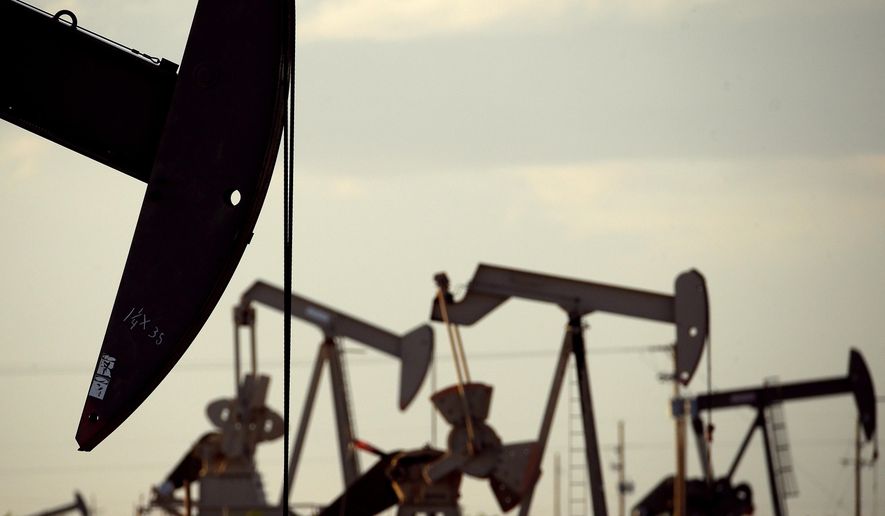The Biden administration, after insisting that its drilling ban applied only to new leases on federal lands, has raised fears that the crackdown will spread to existing projects.
About 70 permits were revoked last week because they were approved in violation of the Interior Department’s Jan. 20 secretarial order. The order requires top political appointees, instead of career staff in bureaus and field offices, to sign off on any application for a permit to drill for 60 days.
“Approximately 70 permits were approved without proper review following the issuance of a department directive that temporarily elevates review of permitting activities (Secretarial Order 3395),” Interior spokeswoman Melissa Schwartz said in an email. “Operators have been notified that those [applications] must be resubmitted for appropriate and timely review. Interior continues to approve permits and will transmit final decisions as soon as possible.”
The permits were pulled under the secretarial directive, not President Biden’s Jan. 27 executive order imposing a “pause” on new leasing on federal lands and waters. Opponents raised concern that the department directive offered a back door for the administration to stall existing oil and gas development.
Kathleen Sgamma, president of the Western Energy Alliance, accused the administration of using administrative sleight of hand to obscure the extent of its oil and gas crackdown, which threatens thousands of jobs and billions of dollars in economic activity.
“President Biden’s own Interior Department has contradicted the statements from just Wednesday’s White House climate press conference promising that his leasing ban would not affect existing leases,” Ms. Sgamma said. “By revoking 70 drilling permits that have been in the works for months, the Interior Department is demonstrating how President Biden’s ill-advised leasing ban has immediate impacts on existing leases and the Western workers and state budgets that depend on that development.”
The terms “leases” and “permits” are often used interchangeably, but they refer to different types of government approvals on oil and gas projects.
After securing a lease — a conditional right to develop oil and natural gas on a specific tract of land or water — an operator must obtain a permit to conduct any “drilling operations or related surface disturbing activities,” according to the Bureau of Land Management.
Mike Sommers, president and CEO of the American Petroleum Institute, said he was “very concerned” about the department’s ability to grind active projects to a halt by delaying or rejecting permits.
“A lot of these kinds of permits that operators get are very routine, and so what they have suggested is a significant slowdown in the issuance of those kinds of permits,” Mr. Sommers said on a press call last week. “Even though [the Jan. 27] announcement did not include a shutdown of permitting activity, I think the first-day actions signal that they’re going to continue to look at the permitting process.”
He added that “we’re very concerned about the slowdown of permits for our operators in the field.”
Mr. Biden’s executive order, part of his ambitious climate agenda, directs the Interior Department to “pause new oil and natural gas leasing on public lands and offshore waters, concurrent with a comprehensive review of the federal oil and gas program.”
The review is intended to offer recommendations on Mr. Biden’s goal of preserving “30% each of our lands and waters by the year 2030, as recommended by scientists, in order to safeguard our health, food supplies, biodiversity, and the prosperity of every community.”
“It does NOT affect oil and gas drilling and fracking on valid existing leases, either onshore or offshore,” the department said in its talking points.
Ms. Sgamma was not convinced. “They’re saying reassuring things about how the leasing ban isn’t going to affect existing leases, and then existing leases are affected,” she said.
“This ‘pause’ on leasing to analyze the full federal oil and natural gas program is going to morph into a long-term ban and will eventually pull in permitting on existing leases,” she said. “It’s only a matter of time, and that time was exactly two days.”
The administration has defended its order by arguing that the oil and gas industry has plenty of unused leases. About 53% of the leased public lands acreage, or 13.9 million acres, is “unused and non-producing,” and 77% of leased offshore water acreage, or 9.3 million acres, is inactive.
“Onshore and offshore, the oil and gas industry is sitting on approximately 7,700 unused, approved permits to drill,” the department said.
Tyler Gray, president of the Louisiana Mid-Continent Oil and Gas Association, said operators respond to market cues. The COVID-19 pandemic drove down oil and gas prices, he said, making it less profitable to drill and slowing production.
“When you talk about the lease sales that were recently put up by the Trump administration, we were in the middle of a global pandemic,” Mr. Gray said. “That’s why we would oppose any sort of ban from the administration now because you want to allow the market to dictate when a company can invest.”
Ms. Sgamma said the Biden leasing ban also would shut down existing projects awaiting leases on adjacent parcels needed to adapt drilling operations to uneven geographical or topographical conditions.
“By isolating adjacent lands, a blanket federal leasing ban affects development of tribal, state, federal and private energy resources,” she said. “These spillover effects are why the Wyoming Energy Authority found that 32,700 jobs will be lost in the very first year of a Biden leasing ban, growing to 58,676 annually by the end of his term.”
The Wyoming study, released in December, found that gross domestic product in the eight Western states would decline by $33.5 billion, dropping wages by $15 billion and state tax revenue by $8.3 billion by 2024.
The alliance sued the Biden administration hours after it issued the leasing ban. The lawsuit said the administration had exceeded its authority and violated federal law governing public lands and environmental reviews.
• Valerie Richardson can be reached at vrichardson@washingtontimes.com.




Please read our comment policy before commenting.